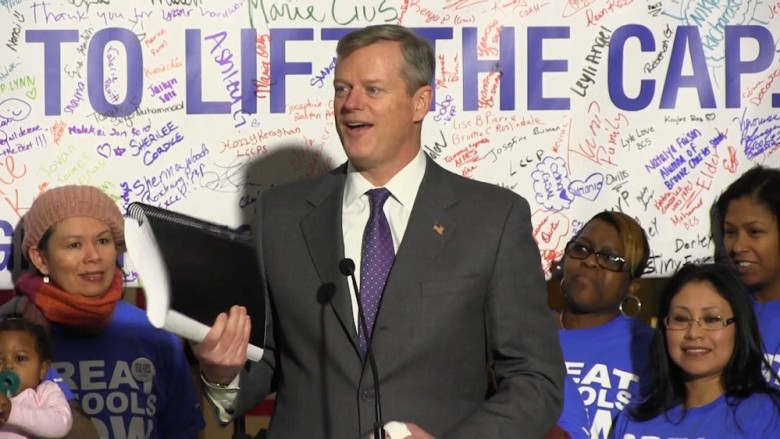Charter waitlists shrink yet still number 34,000 students, state says
By Kara Bettis | February 18, 2016, 18:21 EST
 Massachusetts Gov. Charlie Baker at a rally last month holds up a book containing thousands of signatures from charter school proponents who are pushing to lift the cap on the number of charter schools allowed in the state by law. (State House News photo by Antonio Caban)
Massachusetts Gov. Charlie Baker at a rally last month holds up a book containing thousands of signatures from charter school proponents who are pushing to lift the cap on the number of charter schools allowed in the state by law. (State House News photo by Antonio Caban) BOSTON – The number of students waiting for a place in a charter school declined slightly this academic year, but still numbers about 34,000, the state Department of Elementary and Secondary Education said Thursday.
The 8 percent drop reflects late admission offers and new-seat lotteries during summer or early fall months, the department said, adding that the latest figure is a more accurate number.
Gov. Charlie Baker, a Republican, and advocates for an expansion of statutory limits on charter schools frequently cite the waitlist number as evidence of overwhelming unmet demand. Opponents of expanding the publicly funded institutions, including state teacher unions, have questioned the accuracy of the figure in debating the need for more of the typically nonunion schools. State Auditor Suzanne Bump, a Democrat, has also questioned the figures, citing duplicate counting.
“My staff and the charter school sector have worked hard to ensure the accuracy of the waitlist,” Mitchell Chester, the state’s education commissioner, said in the statement. “I am confident that these numbers reflect parental and student demand for additional high-quality educational options.”
Some students may not accept charter school slots if offered, and some waitlist numbers may reflect students who have remained in that status for multiple years, making it virtually impossible for the department to calculate the exact number of students actively waiting for admission, the department said.
The latest assessment, however, shows that of 75 charter schools that reported figures in March 2015, 74 continued to maintain a waitlist by October, with 43,294 entries that represent 33,903 unique students, the department report shows.
Regardless of the shorter waiting lists, advocates for charter expansion continue to see a clear need for more of the schools.
“Today’s announcement that approximately 34,000 students remain trapped on waiting lists for public charter schools reaffirms the massive demand from families for these great public schools – and how vital it is that we lift the cap immediately to give all families access to the public school of their choice,” Eileen O’Connor, the tk of Great Schools Massachusetts, one of the advocacy groups, said Thursday by email. The group has promoted a measure to expand the number of authorized schools to be placed on the November general election ballot.
Opponents of expansion says it would drain more money from public schools, making it harder to provide for the needs of students who attend, particularly those with special needs.
While Massachusetts law caps their number at 120 statewide, the debate over the proposed ballot question and potential legislative action to lift the limits has reached fever pitch in recent months. Pro-charter polls suggest that 63 percent of Massachusetts voters support greater flexibility with respect to charter schools.
“The demands for public charter schools is still extremely high,” Dominic Slowey, a spokesman for the Massachusetts Charter Public School Association, said about the waitlist numbers. “You have an extremely strong demand, and yet you have a limit on the number of seats available – a demand that continues to be strong but you have growth that is frozen.”
He added that the list seemed about one cycle away from 100 percent accuracy.
“This waitlist has been scrubbed for duplicates and is almost clean of kids who have been on individual school lists for more than a year,” Slowey said.
Last week, charter supporters released a “fact check” campaign, offering data to debunk myths about the schools. Advocates include the charter school association, the Race to the Top Coalition, the Massachusetts High Tech Council, the Boston Charter Alliance and Great Schools. The ballot measure promoted by the latter group would permit granting up to 12 new charters per year in certain areas where the need is deemed to be greatest.
Baker has also advocated for the same rate of expansion and filed legislation to accomplish that goal. Democratic legislative leaders have remained divided over the idea, however.
Contact Kara Bettis at [email protected] or on Twitter @karabettis.











